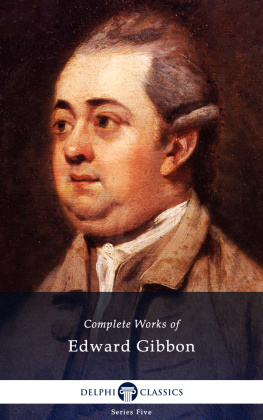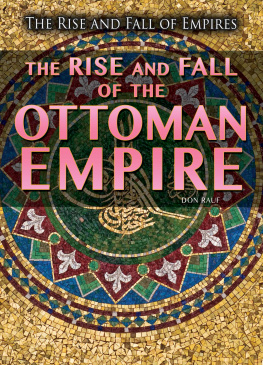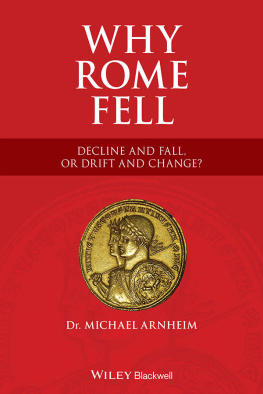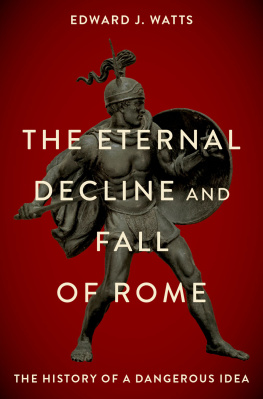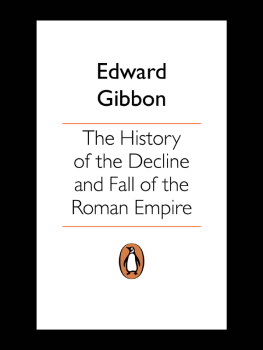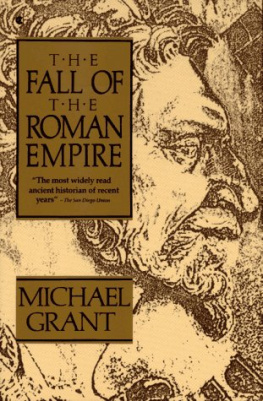Gibbon - The History of The Decline and Fall of the Roman Empire. Volume 1
Here you can read online Gibbon - The History of The Decline and Fall of the Roman Empire. Volume 1 full text of the book (entire story) in english for free. Download pdf and epub, get meaning, cover and reviews about this ebook. year: 2010, publisher: epubBooks, genre: Science. Description of the work, (preface) as well as reviews are available. Best literature library LitArk.com created for fans of good reading and offers a wide selection of genres:
Romance novel
Science fiction
Adventure
Detective
Science
History
Home and family
Prose
Art
Politics
Computer
Non-fiction
Religion
Business
Children
Humor
Choose a favorite category and find really read worthwhile books. Enjoy immersion in the world of imagination, feel the emotions of the characters or learn something new for yourself, make an fascinating discovery.

The History of The Decline and Fall of the Roman Empire. Volume 1: summary, description and annotation
We offer to read an annotation, description, summary or preface (depends on what the author of the book "The History of The Decline and Fall of the Roman Empire. Volume 1" wrote himself). If you haven't found the necessary information about the book — write in the comments, we will try to find it.
Gibbon: author's other books
Who wrote The History of The Decline and Fall of the Roman Empire. Volume 1? Find out the surname, the name of the author of the book and a list of all author's works by series.
The History of The Decline and Fall of the Roman Empire. Volume 1 — read online for free the complete book (whole text) full work
Below is the text of the book, divided by pages. System saving the place of the last page read, allows you to conveniently read the book "The History of The Decline and Fall of the Roman Empire. Volume 1" online for free, without having to search again every time where you left off. Put a bookmark, and you can go to the page where you finished reading at any time.
Font size:
Interval:
Bookmark:
With notes by the Rev. H. H. Milman
1782 (Written), 1845 (Revised)
Strictly Not for Commercial Use.
This EPUB eBook is released under a Creative Commons (BY-NC-ND/3.0) Licence. (http://creativecommons.org/licenses/by-nc-nd/3.0/)
Source text and images taken from the Public Domain.
This eBook is provided for free by

www.epubbooks.com
Support epubBooks and make a donation by visiting: www.epubbooks.com/donations.
The great work of Gibbon is indispensable to the student of history. The literature of Europe offers no substitute for "The Decline and Fall of the Roman Empire." It has obtained undisputed possession, as rightful occupant, of the vast period which it comprehends. However some subjects, which it embraces, may have undergone more complete investigation, on the general view of the whole period, this history is the sole undisputed authority to which all defer, and from which few appeal to the original writers, or to more modern compilers. The inherent interest of the subject, the inexhaustible labor employed upon it; the immense condensation of matter; the luminous arrangement; the general accuracy; the style, which, however monotonous from its uniform stateliness, and sometimes wearisome from its elaborate art., is throughout vigorous, animated, often picturesque always commands attention, always conveys its meaning with emphatic energy, describes with singular breadth and fidelity, and generalizes with unrivalled felicity of expression; all these high qualifications have secured, and seem likely to secure, its permanent place in historic literature.
This vast design of Gibbon, the magnificent whole into which he has cast the decay and ruin of the ancient civilization, the formation and birth of the new order of things, will of itself, independent of the laborious execution of his immense plan, render "The Decline and Fall of the Roman Empire" an unapproachable subject to the future historian:* in the eloquent language of his recent French editor, M. Guizot:
"The gradual decline of the most extraordinary dominion which has ever invaded and oppressed the world; the fall of that immense empire, erected on the ruins of so many kingdoms, republics, and states both barbarous and civilized; and forming in its turn, by its dismemberment, a multitude of states, republics, and kingdoms; the annihilation of the religion of Greece and Rome; the birth and the progress of the two new religions which have shared the most beautiful regions of the earth; the decrepitude of the ancient world, the spectacle of its expiring glory and degenerate manners; the infancy of the modern world, the picture of its first progress, of the new direction given to the mind and character of mansuch a subject must necessarily fix the attention and excite the interest of men, who cannot behold with indifference those memorable epochs, during which, in the fine language of Corneille"
'Un grand destin commence, un grand destin sachve.'""
This extent and harmony of design is unquestionably that which distinguishes the work of Gibbon from all other great historical compositions. He has first bridged the abyss between ancient and modern times, and connected together the two great worlds of history. The great advantage which the classical historians possess over those of modern times is in unity of plan, of course greatly facilitated by the narrower sphere to which their researches were confined. Except Herodotus, the great historians of Greecewe exclude the more modern compilers, like Diodorus Siculuslimited themselves to a single period, or at least to the contracted sphere of Grecian affairs. As far as the Barbarians trespassed within the Grecian boundary, or were necessarily mingled up with Grecian politics, they were admitted into the pale of Grecian history; but to Thucydides and to Xenophon, excepting in the Persian inroad of the latter, Greece was the world. Natural unity confined their narrative almost to chronological order, the episodes were of rare occurrence and extremely brief. To the Roman historians the course was equally clear and defined. Rome was their centre of unity; and the uniformity with which the circle of the Roman dominion spread around, the regularity with which their civil polity expanded, forced, as it were, upon the Roman historian that plan which Polybius announces as the subject of his history, the means and the manner by which the whole world became subject to the Roman sway. How different the complicated politics of the European kingdoms! Every national history, to be complete, must, in a certain sense, be the history of Europe; there is no knowing to how remote a quarter it may be necessary to trace our most domestic events; from a country, how apparently disconnected, may originate the impulse which gives its direction to the whole course of affairs.
In imitation of his classical models, Gibbon places Rome as the cardinal point from which his inquiries diverge, and to which they bear constant reference; yet how immeasurable the space over which those inquiries range; how complicated, how confused, how apparently inextricable the causes which tend to the decline of the Roman empire! how countless the nations which swarm forth, in mingling and indistinct hordes, constantly changing the geographical limitsincessantly confounding the natural boundaries! At first sight, the whole period, the whole state of the world, seems to offer no more secure footing to an historical adventurer than the chaos of Miltonto be in a state of irreclaimable disorder, best described in the language of the poet:
Without dimension, where length, breadth, and height,
And time, and place, are lost: where eldest Night
And Chaos, ancestors of Nature, hold
Eternal anarchy, amidst the noise
Of endless wars, and by confusion stand."
We feel that the unity and harmony of narrative, which shall comprehend this period of social disorganization, must be ascribed entirely to the skill and luminous disposition of the historian. It is in this sublime Gothic architecture of his work, in which the boundless range, the infinite variety, the, at first sight, incongruous gorgeousness of the separate parts, nevertheless are all subordinate to one main and predominant idea, that Gibbon is unrivalled. We cannot but admire the manner in which he masses his materials, and arranges his facts in successive groups, not according to chronological order, but to their moral or political connection; the distinctness with which he marks his periods of gradually increasing decay; and the skill with which, though advancing on separate parallels of history, he shows the common tendency of the slower or more rapid religious or civil innovations. However these principles of composition may demand more than ordinary attention on the part of the reader, they can alone impress upon the memory the real course, and the relative importance of the events. Whoever would justly appreciate the superiority of Gibbons lucid arrangement, should attempt to make his way through the regular but wearisome annals of Tillemont, or even the less ponderous volumes of Le Beau. Both these writers adhere, almost entirely, to chronological order; the consequence is, that we are twenty times called upon to break off, and resume the thread of six or eight wars in different parts of the empire; to suspend the operations of a military expedition for a court intrigue; to hurry away from a siege to a council; and the same page places us in the middle of a campaign against the barbarians, and in the depths of the Monophysite controversy. In Gibbon it is not always easy to bear in mind the exact dates but the course of events is ever clear and distinct; like a skilful general, though his troops advance from the most remote and opposite quarters, they are constantly bearing down and concentrating themselves on one pointthat which is still occupied by the name, and by the waning power of Rome. Whether he traces the progress of hostile religions, or leads from the shores of the Baltic, or the verge of the Chinese empire, the successive hosts of barbariansthough one wave has hardly burst and discharged itself, before another swells up and approachesall is made to flow in the same direction, and the impression which each makes upon the tottering fabric of the Roman greatness, connects their distant movements, and measures the relative importance assigned to them in the panoramic history. The more peaceful and didactic episodes on the development of the Roman law, or even on the details of ecclesiastical history, interpose themselves as restingplaces or divisions between the periods of barbaric invasion. In short, though distracted first by the two capitals, and afterwards by the formal partition of the empire, the extraordinary felicity of arrangement maintains an order and a regular progression. As our horizon expands to reveal to us the gathering tempests which are forming far beyond the boundaries of the civilized worldas we follow their successive approach to the trembling frontierthe compressed and receding line is still distinctly visible; though gradually dismembered and the broken fragments assuming the form of regular states and kingdoms, the real relation of those kingdoms to the empire is maintained and defined; and even when the Roman dominion has shrunk into little more than the province of Thracewhen the name of Rome, confined, in Italy, to the walls of the cityyet it is still the memory, the shade of the Roman greatness, which extends over the wide sphere into which the historian expands his later narrative; the whole blends into the unity, and is manifestly essential to the double catastrophe of his tragic drama.
Font size:
Interval:
Bookmark:
Similar books «The History of The Decline and Fall of the Roman Empire. Volume 1»
Look at similar books to The History of The Decline and Fall of the Roman Empire. Volume 1. We have selected literature similar in name and meaning in the hope of providing readers with more options to find new, interesting, not yet read works.
Discussion, reviews of the book The History of The Decline and Fall of the Roman Empire. Volume 1 and just readers' own opinions. Leave your comments, write what you think about the work, its meaning or the main characters. Specify what exactly you liked and what you didn't like, and why you think so.

